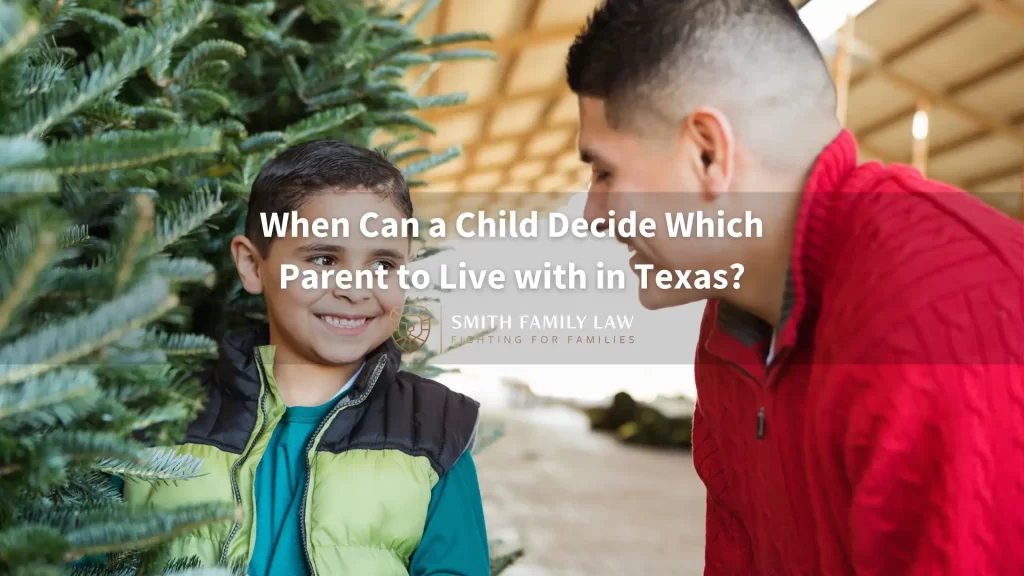Can a child decide which parent to live with in an Austin, Texas, custody case? Technically, no. A minor child can’t make this decision. Their parents must arrive at a settlement that addresses custody. If they can’t, the court must issue a custody order.
There are circumstances in which a court may account for a child’s preferences when making a decision. A child’s age is a factor determining whether a court will do so. Although a child can’t make this decision, a mature child can communicate their wishes to the court.
At What Age Can a Child Choose Which Parent to Live with in Texas?
A child can’t officially decide which parent they will live with in Texas until they reach the age of 18. When they’re an adult, they can determine whether they want to live with a parent.
However, a court may consider a minor’s child custody preference. In Texas, at what age can a child express their preference about which parent they should live with?
Per the Texas Family Code 153.009, when a child reaches the age of 12, they can express their wishes. Children 12 years old or older can speak with judges privately at the request of their attorneys or other such parties. Although the conversation is generally private, a court reporter must be present.
A family law judge doesn’t have to speak with a child upon request if they are under 12, but they may if they wish to do so. Nor do they have to account for a child’s desires when issuing a custody order, even if they’re 12 or older. The court’s goal is always to make a decision that supports the interests of the child. However, in a custody case, a mature child’s input may prove valuable.
It’s worth noting that the law doesn’t necessarily let a child choose which parent they will live with. Instead, it allows a child to state which parent they believe should have the right to make such decisions.
Where a Child Will Live After Divorce in Texas: Important Information About the “Holley Factors”
When making a custody decision, a court should account for certain factors called the “Holley Factors.” This name comes from the case of Holley v. Adams. In this case, the Texas Supreme Court specified the factors courts must account for when attempting to make a decision in a child’s best interests.
These factors are:
- The child’s preference
- The child’s current and future emotional and physical needs
- Whether either parent will pose an emotional or physical risk to the child now or later
- The abilities of those seeking custody to be effective parents
- Whether any programs are available to assist the parents
- The plans those seeking custody have for the child
- How stable each parent’s home is
- Whether any parent has omitted information that would suggest the parent-child relationship isn’t proper
- Any other omissions or excuses of either parent
As these points indicate, a child’s desires are just one factor a court should consider. It may not be the deciding one. A child who is 12 may not necessarily be able to accurately evaluate the stability of a home. It’s unlikely a child of 12 could understand the role of assistance programs or be knowledgeable about the other required factors that make up the child custody determination. A judge must consider the degree to which a child understands the complexities of these situations and make a reasoned custody order.
What if a Child Wants to Live with a Non-Custodial Parent in Texas?
A child may not agree with the final custody order. They may wish to live with their non-custodial parent.
If a child has a valid reason for feeling this way, their parents may consider changing the custody arrangement. They can petition the court accordingly. However, there’s no guarantee the court will modify an existing custody order. As always, the court must consider the child’s best interests when making custody decisions.
Sometimes, a child runs away to their non-custodial parent’s home. Texas child custody laws and criminal laws very clearly indicate the responsibilities of the non-custodial parent in these circumstances. They must report the incident and abide by existing custody orders. This means returning the child to their custodial parent. Failure to do so may result in being charged with a crime like Harboring a Runaway Child.
Reasons a Court Won’t Account for a Child’s Preferences

- A child’s apparent reason for wanting to live with a parent – Children mature at different stages. Additionally, when parents are divorcing, upset children may not behave as maturely as they usually do. An immature child may want to live with one parent for immature reasons. For example, a child decide to live with a parent who doesn’t make them do their homework.
- A child is being manipulated – Children don’t suddenly become invulnerable to manipulation when they reach 12 years of age. It’s possible that a parent is manipulating a child to express a particular custody preference.
- A child doesn’t understand their needs – A child may not thoroughly understand how one parent is better suited to serve their needs than another.
In addition, a child has limited life experience. They probably won’t have considered how their needs will change in the future. These are just a few reasons a child’s preference might not be the deciding factor in such cases.
Contact an Austin, Texas, Family Law Attorney
Navigating child custody issues can be complex. You must manage your emotions while fighting for the rights of yourself and your child.
The process of crafting a custody arrangement or persuading a judge to grant you custody is easier when you know you have a qualified advocate on your side. That’s exactly what you’ll find at Smith & Bledsoe Family Law. Our team in Austin, TX, family law attorney is available to help you present the strongest case you can. Get started today by contacting us online or calling us at (512) 277-3166 for a free case review.
Related Reading:
